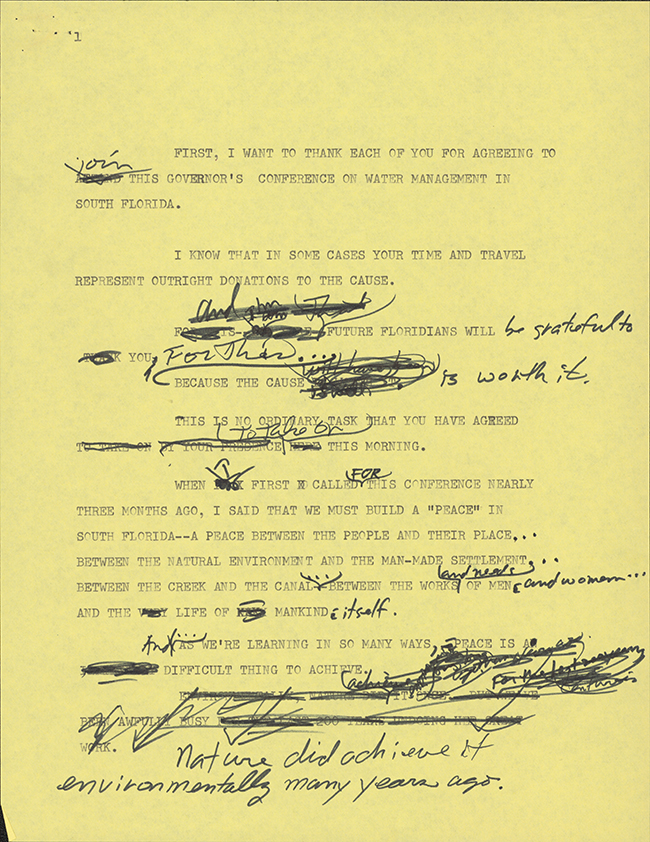The History of Water in Florida
Governor Reubin Askew's Speech at the Governor's Conference on Water Management in South Florida (1971)
From: Governor Askew, Speech files, 1971-1979 (Series 65, Box 2, File Folder 28)
The page numbers in this document indicate that some pages were not included. Multiple copies of this document in Governor Askew's papers share this pattern, and draft copies show the speech was cut down from the original text.

WATER DOC 22: SPEECH OF GOVERNOR ASKEW, 1971
[Address of Governor Reubin O. Askew at the Governor’s Conference on Water Management in South Florida, September 22, 1971]
First, I want to thank each of you for agreeing to join this Governor's Conference on water management in South Florida.
I know that in some cases your time and travel represent outright donations to the cause.
Future Floridians will be grateful to you for this, because the cause is worth it.
This is no ordinary task that you have agreed to take on this morning.
When I first called for this conference nearly three months ago, I said that we must build a "peace" in South Florida -- a peace between the people and their place... between the natural environment and the man-made settlement... between the creek and the canal... between the works and needs of men and women and the life of mankind itself.
And as we're learning in so many ways, peace is a difficult thing to achieve. Nature did achieve it environmentally many years ago.
[Page 2]
But for the last two centuries, we've been awfully busy undoing her work.
Whether we can now regain or even approach the natural balance which was given to us in South Florida could well determine if this area is to continue as a leading resort or the nation's winter vegetable garden. Failure could make it instead the world's first and only desert which gets 60 inches of rainfall yearly.
Hundreds of deer and other mammals perished by drowning in South Florida floods last year. Thousands of acres of rich muckland were burned into nothingness in South Florida fires this year.
... and somehow... we all know... we're to blame.
Only 50 years ago, there was fresh water in Biscayne Bay. Now the City of Miami must go ten to twelve miles inland in an evermore difficult sarch for its water.
... and somehow... we all know... we're to blame.
The Miami Beach sewage system is mostly salt water. By draining our fresh water out to sea in order to enjoy short-term land use benefits, we have created a serious water shortage in this area. Sea water is invading the aquifers and wells where fresh water was once sovereign.
... and somehow... we all know... we're to blame.
[Page 3]
Already the cities, the farms, and the Everglades National Park are engaged in fierce competition for Lake Okeechobee's dwindling supply of water. As the population expands and the supply continues to dwindle, that competition is expected to become critical.
And the population of South Florida... now 2.5-million people... is indeed expected to double before the year 2000.
We are faced not only with a decline in water quantity... but in water quality as well.
Recent sample tests of the Florida Game and Freshwater Fish Commission show that all fish in Lake Okeechobee -- South Florida's principal drinking water supply -- contained pesticides, including DDT, toxaphene, endrin, chlordane... "almost the entire spectrum of persistent pesticides."
As Rachel Carson once wrote: "If the Bill of Rights contains no guarantee that a citizen shall be secure against lethal poisons distributed either by private individuals or by public officials, it is only because our forefathers [...] could conceive of no such problem."
Clearly in the case of pesticide intrusion, we know that we're all to blame.
[Page 4]
But the problem doesn't stop there. Despite all the fine statements of commitment, despite all the laws and ordinances which have been passed, and despite all the appropriations, the publicity and most vigorous attempts ever at pollution law enforcement ... despite all of these things, we're still dumping municipal and industrial waste into our limited water supplies.
It has been said by some that Lake Okeechobee is eutrophic, that it is dying.
It has been said by others that this is not so, that the water quality of the nation's second
[Page 5]
largest freshwater lake is as good or better than any of the state's other inland waters.
The mere presence of doubt on so serious a question is, I think, an alarming thing to behold.
It is time, ladies and gentlemen, that we settled on the answers to questions like this... however harsh those answers might be.
It is time we stopped viewing our environment through prisms of profit, politics, geography or local and personal pride.
[Page 6]
It is time for us to work together... to accept the truth about our problems in South Florida, and to set about solving them.
It is time for us to do all of these things... because you know as well as I that the alternative will be disastrous... economically as well as aesthetically.
The loss of our Everglades muck soils alone could lead us quickly down the path to economic ruin.
A recent study of subsidence of organic soils in the United States estimates that the Everglades lost 40 per cent of its soil between the years 1912 and 1950. The estimate
[Page 7]
jumps to 66 per cent by 1970 and predictions are that we will have lost 88 per cent of our soil by the year 2000.
What then is to become of our multi-million dollar farming industry?
And what then is to become of those millions of South Floridians who are to be living here in the year 2000? Are they to be deprived of food as well as water?
We can't afford to let this happen.
This is why I've called this conference. Florida's political leaders and Florida's people must have help, knowledgeable help in meeting the
[Page 8]
terrible challenges we have thrust upon ourselves through years of ignorance and neglect.
How are we going to prevent or control muck fires and the intrusion of salt water next winter and spring?
How are we going to head off a disastrous shortage of high quality, fresh water?
What can we do to stop the loss of muck soil?
Must there be a limit on South Florida's population?
Who should manage the natural resources of South Florida and what powers should they be granted to do so?
[Page 9]
As you struggle with these and other questions we've submitted to the conference, please remember that we want answers -- and we want them stated clearly, bluntly and forcefully.
This is not the time for diplomatic obscurity.
Not only are you asked to work together quickly and constructively, in the same process you must clearly express your differing views. I realize what a challenge that can be. But such an assignment recognizes that a good and open fight is often one of our more vigorous and effective methods of searching for the truth.
[Page 10]
And the truth, after all, is what we must have today in order to survive tomorrow.
We are, incidentally, taking the initiative in searching for the truth about the channelization of the Kissimmee River.
I have asked Dr. Ariel Lugo of the University of Florida to do a study -- funded at my request by the U.S. Army corps of Engineers -- on the effects of that channelization.
Of course I realize that no study and no three-day conference on Miami Beach is going to solve our water management and pollution problems.
[Page 11]
It will take hard work. And it will take money as well.
It is for this reason and this reason only that I feel I must put to you the question of revenue as well as all of the other difficult questions on your agenda.
Fighting pollution and ending environmental waste in our state requires money ... just as every other activity of state and local government requires money.
And Florida, because of an unfair and unproductive revenue structure, is having serious problems meeting its existing financial obligations.
[Page 12]
I regard the corporate profits tax amendment, which goes on the ballot Nov. 2, as an essential step to the financial solvency which this state must have. We must have adequate revenue if we're ever to meet our environmental problems intelligently and... yes... economically as well.
For this reason, I hope that you will vote Nov. 2 and urge others to do so.
For we'll be voting not for a candidate or a group of candidates, or a bond issue or a special interest loophole.
On the contrary, we'll be voting for Florida.
[Page 13]
Thank you for agreeing to participate.
Let's make these three days the beginning of the beginning for South Florida -- for its people, its land, its wildlife and its water.
Thank you... and good luck.
#

 Listen: The Assorted Selections Program
Listen: The Assorted Selections Program